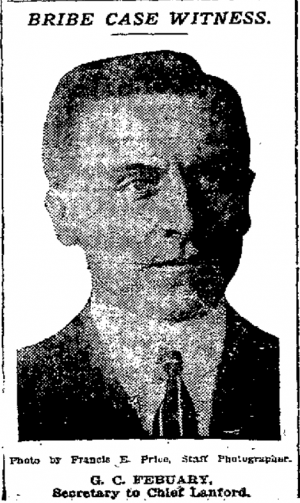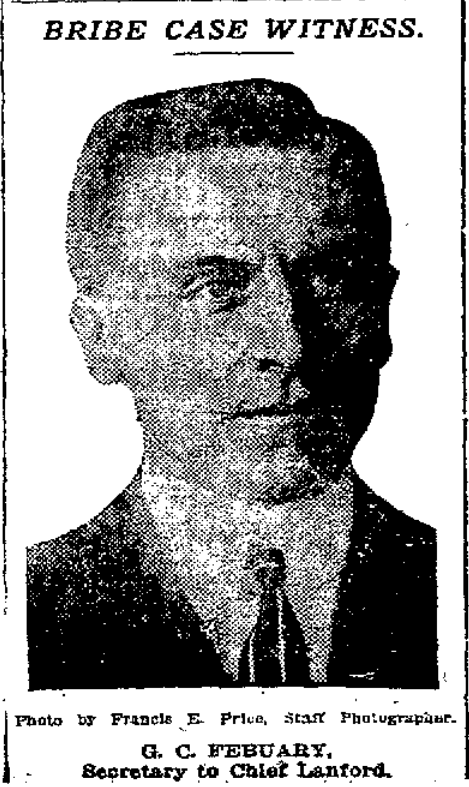
Another in our series of new transcriptions of contemporary articles on the Leo Frank case.
Atlanta Constitution
Sunday, May 25th, 1913
The probability of bribery charges to be made against others as well as Colonel Felder was intimated last night by Chief Lanford to a Constitution reporter.
Documentary evidence involving one or more men is rumored to be in Lanford’s possession. Also, his dictagraph [sic] is said to have reported secret conferences relating to the use of bribe money in the Mary Phagan case.
This new phase of the bribery charges is said to pertain only to the bribing of witnesses in the Phagan investigation. Rumors to this effect have been coming to police headquarters for several days. Corroboration of the reports came recently from Mrs. Mima [sic] Famby [sic], of 400 Piedmont avenue, a witness in the case.
Offered Money to Leave City.
Mrs. Famby declared to a reporter for The Constitution that she had received six offers of large sums of money to leave the city until the Mary Phagan trial has been finished. It is said that she has made an affidavit, naming the men who approached her, and that the document is in the hands of Chief Lanford.
Lanford declared to a Constitution reporter that he would not reveal his new bribery evidence until the trial. He would not state the nature of affidavits said to be in his hands.
Solicitor Dorsey has been apprised by Harry Scott of the position of the Pinkerton agency in the Phagan investigation. The solicitor said last night that Scott had told him that, primarily, the detective organization was in the employ of Frank’s defense, in that it was paid by the National Pencil company, and that reports of his progress were turned over to the suspect’s counsel.
Saying that he was retained purely to learn the truth of the murder, the solicitor avers Scott told him that the evidence he had so far unearthed pointed to Frank, and that he was directing his investigation to that end. Scott’s opinion, as it is said to have been expressed before the grand jury Saturday, was that the imprisoned superintendent was guilty.
Affidavit of Connally [sic].
The following is the affidavit signed by James Connally, the negro sweeper who confessed to having written the murder notes at Frank’s dictation:
“On Friday evening before the holiday, about four minutes to 1 o’clock, Mr. Frank came up the aisle and asked me to come to his office. That was the aisle on the fourth floor, where I was working, and when I went down to the office, he asked me could I write, and I told him yes, I could write a little bit, and he gave me a scratch pad and told me to put on there, dear mother, a long, tall black negro did this by himself, and he told me to write two or three times on there. I wrote it on a white scratch pad, single ruled.
“He went to his desk and pulled out another scratch pad, a brown-looking scratch pad, and looked at my writing and wrote on that himself, but when I went to his office he asked me if I wanted a cigarette, and I told him yes, but they didn’t allow any smoking in the factory, and he pulled out a box of cigarettes that cost 15 cents a box, and in that box he had $2.50 in paper dollars and two quarters, and I taken one of the cigarettes and handed him the box back, and he told me it was all right, I could keep the box, and I told him he had some money in the box, and he said that was all right, I was welcome to that, for I was a good working negro around there, and then he asked me where was Gordon Bailey (Snowball, they call him), and I told him he was in the elevator, and he asked me if I knew the night watchman, and I told him no sir, I didn’t know him, and he asked me if I ever saw him in the basement, and I told him no sir, I never did see him down there, but he could ask the fireman and maybe he could tell him more about that than I could; and then Mr. Frank was laughing and jollying and going on in the office, and I asked him not to take not any money for that watch man I owed, for I didn’t have any to spare, and he told me he wouldn’t, but he would see to getting some money a little bit later.
“He told me he had some wealthy people in Brooklyn, and then he held his head up and looked out of the corner of his eyes and said: ‘Why should I hang?’ and that’s all I remember him saying to me. When I asked him not to take out money for the watch, he said, you ought not to buy any watch, for that wife of mine wants me to buy her an automobile, but he wouldn’t do it; I never did see his wife. On Tuesday morning after the holiday on Saturday, before Mr. Frank got in jail, he come up the aisle where I was sweeping and held his head over to me and whispered me to be a good boy and that was all he said.”
* * *
